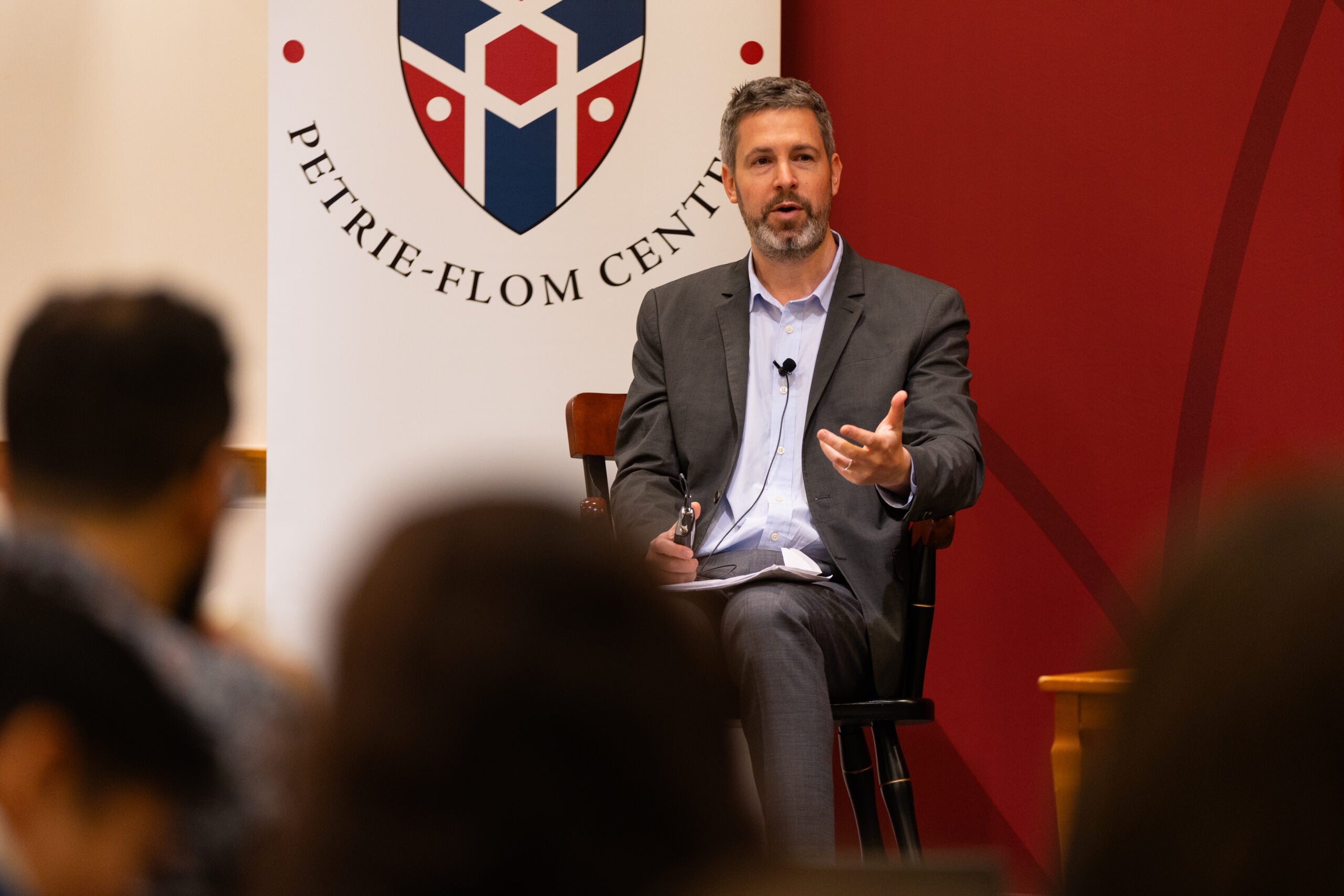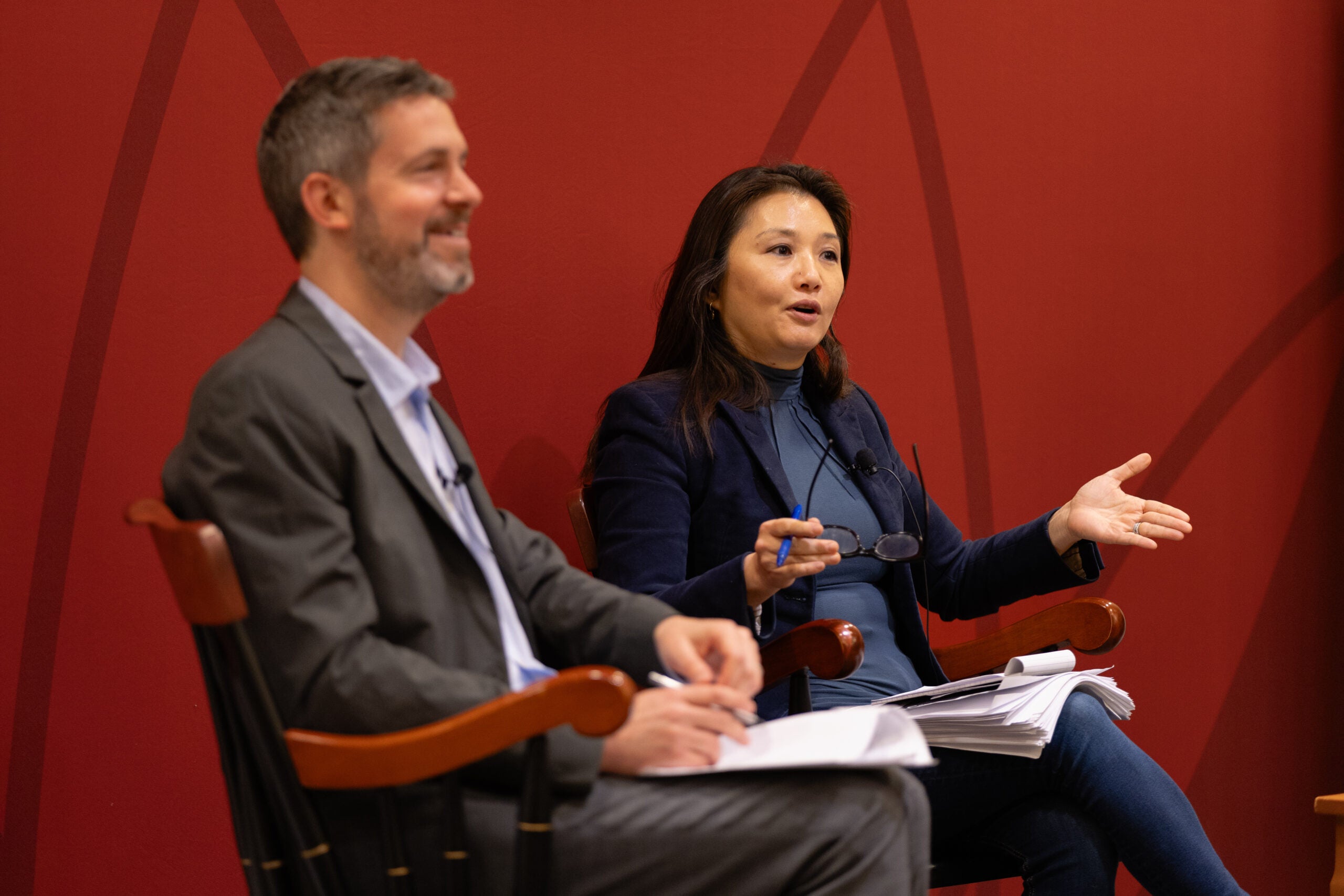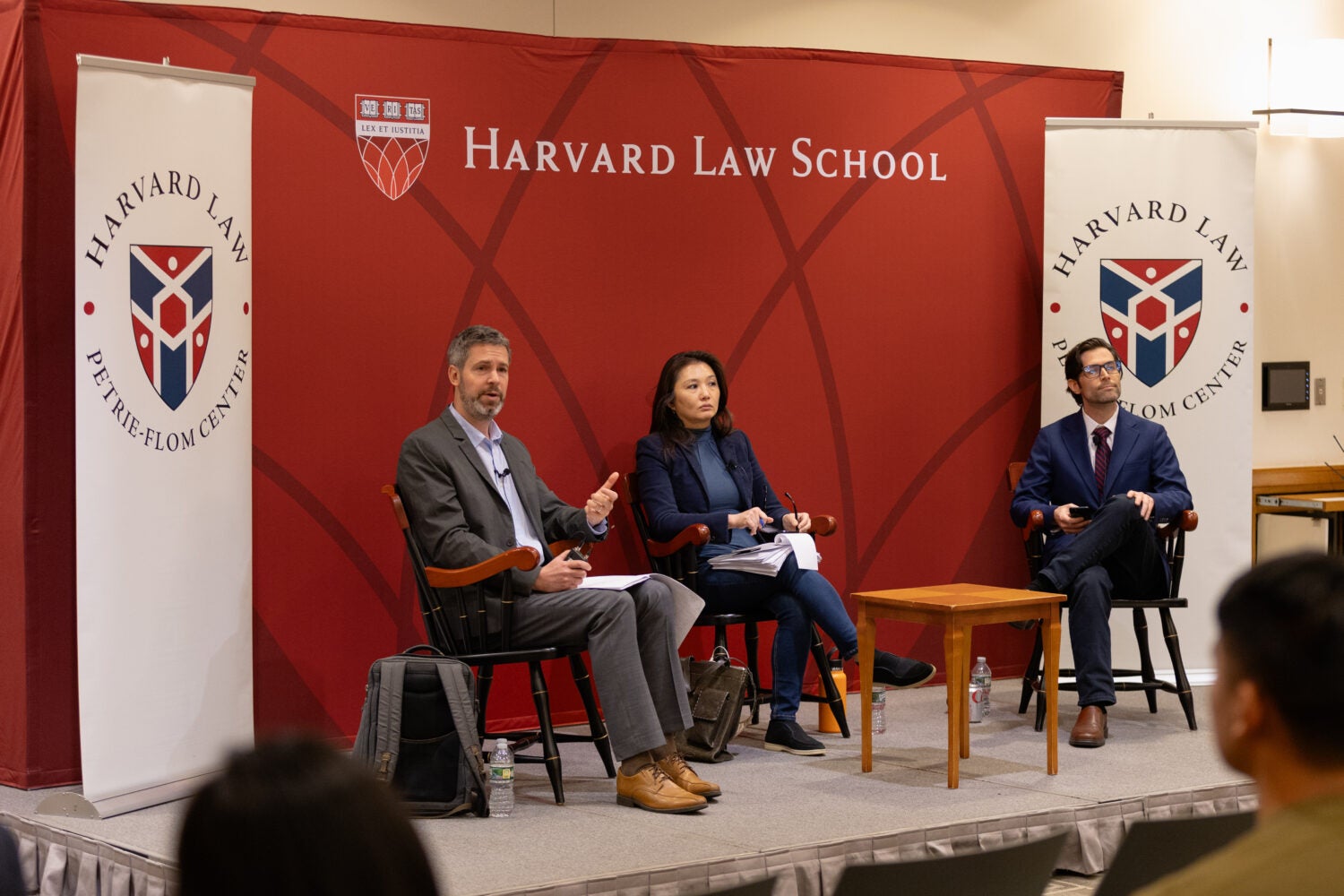There are many legal arguments for less-restrictive drug laws. But a book talk at Harvard Law School last week suggested one of the more creative: If the Constitution allows for the right to travel, shouldn’t a “trip” on LSD be included?
While no court has bought this particular argument, drug laws have gone through changes since the ’60s and ’70s, and not always toward leniency. Author David Pozen examines this history in his new book, “The Constitution of the War on Drugs,” which he discussed last week with panelist Jeannie Suk Gersen ’02, who is the John H. Watson, Jr. Professor of Law at Harvard Law School and a contributing writer for The New Yorker. The event was organized by the Petrie-Flom Center at Harvard Law School and cosponsored by the Institute to End Mass Incarceration and the Malcolm Wiener Center for Social Policy at Harvard Kennedy School.
Moderator Mason Marks, who leads the Project on Psychedelics Law and Regulation at the Petrie-Flom Center, pointed out that drug law and policy “do feel like they’re having a moment right now. We had two presidential candidates both endorsing some form of marijuana policy reform, and psychedelic medicines even made an appearance during the election.” Echoing a famous Buffalo Springfield lyric from the heyday of ’60s drug culture, Marks noted there’s something happening here, but what it is may not be exactly clear.
Summarizing themes in his book, Pozen noted a general crackdown in drug laws since a “period of possibility” in the 1960s and ’70s. The conservative tilt since then, he suggested, can be traced to an absence of applying the Constitution to modern drug policy. “I find it really interesting, puzzling,’’ he said, “that drug reform groups almost never enlist the Constitution in their attacks on criminal drug laws.”
Many of the central “tropes” of the drug reform movement — individual liberty, racial equality, and rational government decision making — are also central to modern constitutional law, he noted. In the past, there were many constitutionally based arguments for looser drug laws, and those are largely forgotten today. The question to be examined is “When and under what conditions can the government prohibit and penalize drug behaviors in the first place?”

The ’60s and ’70s, he said, brought a recognition that “if you allow the government to criminally prohibit popular drug behaviors, you are going to get extremely intrusive and invasive and radicalized police tactics. Because how else are you going to enforce those laws?”
During that era, Presidents Gerald Ford and Jimmy Carter both favored loosening drug laws, and the Constitution was often used to rein in such restrictive laws. Griswold v. Connecticut (1965) established a right for married couples to use contraceptives, based on the right to privacy. “Drug lawyers immediately recognized that Griswold is a resource to challenge drug prohibitions that extend into the home,” he said. Notably, the Alaska Supreme Court ruled in Ravin v. State (1975) that small amounts of marijuana could legally be used at home.
Likewise, a number of Eighth Amendment cases, including Robinson v. California (1962), ruled that criminalizing drug addiction constituted cruel and unusual punishment. The California case People v. Woody (1963) allowed Native American groups to use peyote for spiritual reasons under the Free Exercise Clause of the First Amendment. In 1978, Harvard Law School Professor Laurence Tribe ’66 argued that drug prohibitions amounted to thought control, impermissible under the First Amendment.
“I find it really … puzzling that drug reform groups almost never enlist the Constitution in their attacks on criminal drug laws.”
David Pozen
By 1980, however, federal appellate courts turned back this tide, arguing that privacy claims only applied to drug use if a “fundamental” interest was being threatened, and “this became fatal to the drug rights movement,” said Pozen. Courts also pulled away from the rational argument that marijuana is less harmful than cigarettes or alcohol, reasoning that courts don’t render decisions on relative dangers.
Particularly distressing, Pozen noted, was the “profound racial skew” of prosecutions for crack versus powdered cocaine. “Litigants were unable to convince the federal appellate courts that the crack/powder disparity was created because of a desire to subordinate any particular racial group, even though it was having that effect.”
The very phrase “drug rights” is not one that you often hear, Gersen pointed out. She connected this to a certain aspect of the American legal mindset, where life and liberty are more vigorously protected than the pursuit of happiness. “You have a right to … the government not doing things to you. You don’t have a right to something positive, in our American system,” she said. “The government is not entitled to do stuff to help you pursue your happiness. And I think what you’re getting at here,” she told Pozen, “is that drugs kind of fits into that box of pleasure and self-fulfillment.”

Referring to a course that she once taught on vice, she suggested that prostitution, gambling and drugs, which don’t necessarily cause harm, simply make society uncomfortable. “We associate [these] things that people do, the immorality, with carnal pleasure, or the pleasure of the body, the pleasure of being dissolute and not doing things that are orderly and having a job and keeping up with your obligations as a citizen,” she said. While other vice laws have gone through reform, drug laws largely have not — in part, she suggested, because they fall under the “pursuit of happiness” rather than the “liberty” umbrella.
Citing the effect of such thinking on her own generation of lawyers, Gersen recalled the case of Judge Douglas H. Ginsburg, the former Harvard Law School professor whose 1987 Supreme Court nomination collapsed after word got out that he had smoked marijuana earlier in life. “What do you think that does to the generation of lawyers who are going to college and law school in the ’90s and are thinking they need to get jobs in the government and maybe be professors someday?” she said. “We are drug virgins, all of us. Our entire generation. We have not ingested, and we definitely didn’t inhale.”
Want to stay up to date with Harvard Law Today? Sign up for our weekly newsletter.
